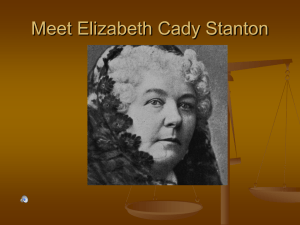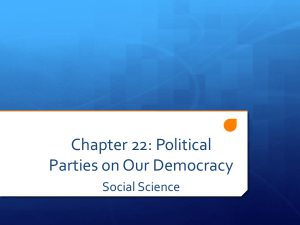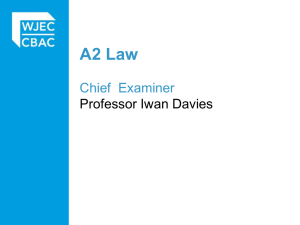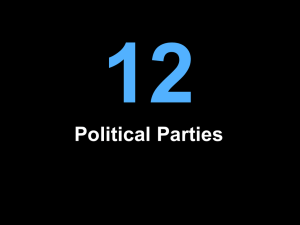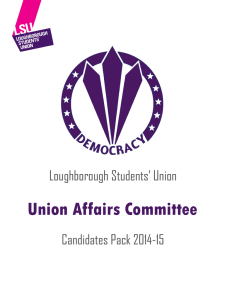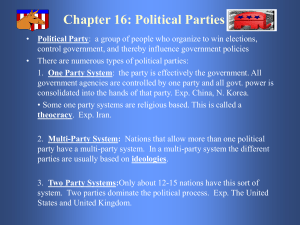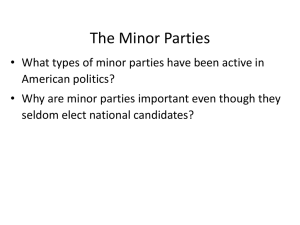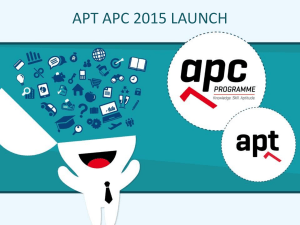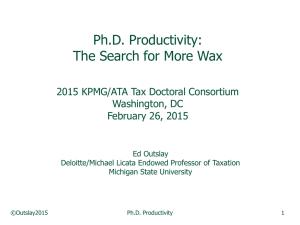December 2012 – Elizabeth (what the examiners want)
advertisement
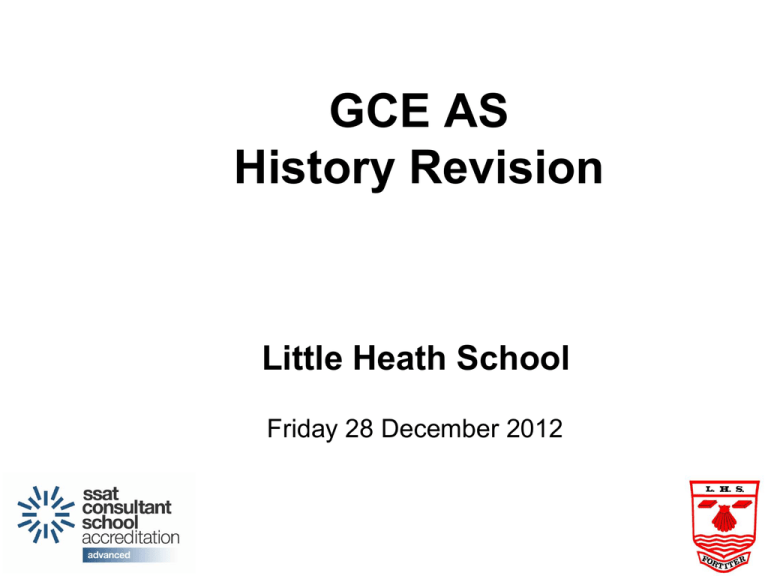
GCE AS History Revision Little Heath School Friday 28 December 2012 Meet the Examiner Top tips F961/01 AS Period Studies 10.30 – 10.50 The Examination Two essays 45 minutes each Choice of 3 titles Classic Mistake • “Candidates need to be reminded to actually answer the question that is set not the one they are expecting or have practised before”. Plans • “The best students seemed capable of focused argument without planning; weaker students might find it profitable to plan their response briefly and then check for relevance before they start writing, thereby focusing precisely on the question actually set, rather than the one they imagine has been set”. • “A lot of time was wasted by some candidates who wrote lengthy plans, and didn’t develop them in the essay. Candidates are reminded that a plan is treated as such and not marked”. Introductions • “Some candidates wrote lengthy introductions and then repeated their points in the main part of the essay without really elaborating any further”. • “An introduction is not a list of events and dates that the candidate intends to bring in to their response regardless of the question”. • “Candidates should see the introduction as vital and use it to set out their thesis (ARGUMENT) or point of view, which should then be followed through in the remainder of the essay”. Don’t DESCRIBE, ARGUE • “It was pleasing to find few answers that resorted to straightforward description and little else, most candidates are able to display some ability to argue and therefore reach Level III”. • “Stronger responses were analytical throughout the essay and often made links back to the named factor, weaker ones tended to write a list and give some basic analysis at the end of paragraphs or in a brief, summative conclusion”. Assess & How Far • “Many candidates clearly do not understand what the command ‘assess’ actually means. Centres would do well to remind their students that assessment is not listing, there has to be a judgement of importance. It was a similar story with ‘how far’ type questions”. • ASSESS answers need JUDGEMENT OF IMPORTANCE • HOW FAR answers need JUDGEMENT OF EXTENT Conclusions • “The conclusion should follow naturally from the introduction and reinforce the line of argument that has been taken; this involves thinking through the line of argument before starting to write”. • “It adds weight to the need for a plan that focuses on the question”. How to annoy the marker • “Candidates should be reminded that it is a huge help to examiners if some space is left between the two answers, to allow room for marking”. How to get stuck at C • “Answer considers a number of factors but with very little evaluation of importance or linkages between factors”. • “Answers may be a mixture of analysis but also contain simple description of relevant material and narrative of relevant events”. Or • “Answers may provide more consistent analysis but the quality will be uneven and supporting evidence often general or thin”. Chief Examiner’s Report – June 2012 How to achieve A • A clear and accurate understanding of the significance of historical issues; • Answer is consistently and relevantly analytical with developed and substantiated explanations (a wide range of accurate, detailed and relevant evidence); • The argument evaluates a range of relevant factors and reaches clearly substantiated judgements about relative importance and/or the links between them. Chief Examiner’s Report – June 2012 How successful was Elizabeth I in dealing with the problems she faced between 1558 & 1663? • • • • • • • • Candidates should focus on ‘how successful’ and not just list examples of success and failure. Candidates might start by identifying the problems that Elizabeth faced and then go on to assess how successfully she dealt with them. There are a range of issues that candidates might consider, but what matters is the quality of analysis. Candidates might consider the religious problem and argue that given the divided state of the nation Elizabeth did remarkably well to keep outward religious harmony with the settlement, others might suggest that she disappointed both protestants and Catholics by the moderate nature of the settlement. It is likely that the issue of her legitimacy will feature in many answers and given the possible challenges to her position she was successful as she was able to avoid rebellion and unrest and secure the throne. This might be linked to foreign relations. England was at war with France and Elizabeth successfully ended that, even if it meant recognising the loss of Calais; the war had been a drain on resources. Under Mary, England had been a close ally of Spain and Elizabeth was able to keep relations with Spain friendly at the start of the period. This was particularly successful as it made it less likely that France would invade in support of Mary Stuart. Elizabeth was also careful not to dismiss Philip’s marriage proposal too quickly. It might also be argued that Elizabeth dealt successfully with relations with Scotland, which could have been difficult given the ‘Auld Alliance’ and claim of Mary Stuart. Under pressure from her councillors she supported the Protestant Lords and this began the decline of French influence in the kingdom and would help to secure the northern border. Candidates might also consider the issue of faction and the composition of the Council. Some might also consider the financial inheritance, which was improved with the ending of the war. January 2012 How far was Parliament able to increase its role & influence in the reign of Elizabeth I? • • • • • • • • • • Candidates will need to address the issue of ‘how far’ and not simply list examples of where parliament did or did not increase its role and influence. Examiners should not over-reward candidates who simply describe the Neale/Elton debate. At the higher levels candidates might make a distinction between the Lords and Commons. Despite the more regular calling of parliament and their apparently increasing role, Elizabeth decided when to summon, prorogue and dissolve parliament and this in itself was a limiting factor. Candidates may make reference to a variety of issues, particularly religion, succession, freedom of speech and monopolies in considering whether parliament increased its role and influence. Some might argue that in nearly all instances it was the queen’s will that triumphed and suggest that this shows no increase in their role and influence. Attempts to gain freedom of speech or attack Elizabeth’s prerogative ended in failure. Discussion of the succession and marriage was always curtailed and Elizabeth remained in control. Some might argue that the latter period saw parliament increase its role in the Monopolies debate, but this can be balanced by the Golden Speech, showing how Elizabeth was able to regain the initiative, even in her later years. However, they did increase their influence as a sounding board for government policies and their involvement in a wide range of new social measures in the later part of the period suggests a new role. January 2012 Assess the causes of Elizabeth I’s financial problems? • • • • • • • • • Candidates should evaluate the relative importance of the causes and reach a balanced judgement, not simply provide a list of factors that caused the problems. There are many factors that candidates might consider and it is not expected that they will consider all, what matters is the quality of the analysis. There may be consideration of the Marian inheritance and the cost of the war with France. The rising cost of warfare might also be considered in relation to both the long war with Spain and the cost of controlling and governing Ireland. The rising cost of warfare might also be linked to the problem of inflation, which was particularly acute during Elizabeth’s reign and had a serious impact on crown income. The taxation system was outdated and new assessments were not undertaken and this meant that the Crown income suffered even more from the problem of inflation. Reliance on parliament for extraordinary income was not desirable and Elizabeth was sometimes reluctant to summon them, resulting in dependence upon ordinary income. There had been a decline in ordinary income as crown lands had been sold off to finance war and inflation reduced the real value of the income. Attempts to raise money through schemes such Monopolies were unpopular and might be seen as another limiting factor. Customs had provided a significant source of income, but with war and the decline in the Antwerp market this was also in decline. January 2012

